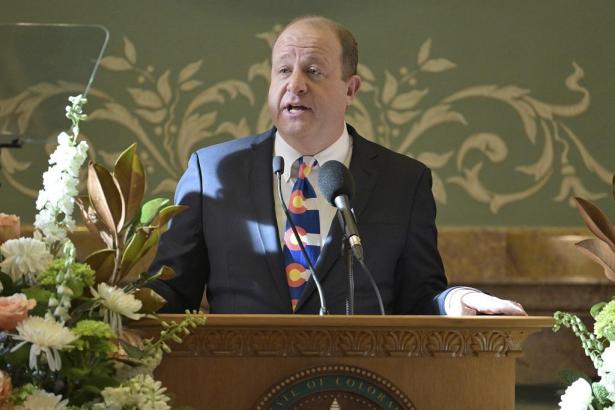On Friday, Colorado Gov. Jared Polis, a Democrat, vetoed a bill passed by the Democratic-controlled legislature that repealed the state’s sui generis right-to-work law. Colorado legislators had voted to pass the Worker Protection Act (SB25-005) by a 22-to-12 margin in the Senate and by 43-to-22 in the House, in both cases along party lines.
Existing Colorado labor law—the Labor Peace Act—was enacted in 1943 before the 1947 Taft-Hartley Act enabled states to pass right-to-work laws that curtailed unions’ ability to collect dues from all the workers they represented in collective bargaining. Colorado’s Labor Peace Act prefigured those right-to-work laws in several ways. Under its terms, once a majority of workers vote to form or join a union, it requires that union to win 75 percent of the workers’ votes in a second election to be able to collect dues from all the workers it represents once it has successfully bargained a contract with the employer.
The difficulty unions have in clearing that second bar—a hurdle unique to Colorado—explains in large part why the percentage of unionized Colorado workers is so low. Data from the Economic Policy Institute indicates that Colorado’s union density (7.7 percent in 2024) much more closely resembles that of right-to-work states (with an average of 6.2 percent in 2024) than non-right-to-work states (15.8 percent in 2024). Colorado is the only state with Democratic trifecta control of government to have such a law.
The bill Polis vetoed drew unanimous support from Democratic legislators, and from Colorado Worker Rights United, a statewide coalition of labor unions and worker centers. Given that vetoes occurring after the Colorado General Assembly’s session can’t be overridden, there isn’t an opportunity for legislators to nullify Polis’s decision.
“I believe there must be a high threshold of worker participation and approval to allow for bargaining over mandatory wage deduction. And SB 25-005 does not satisfy that threshold, which is why I am vetoing the bill,” Polis wrote in his veto letter.
This marks a sharp departure from the views Polis presented when he sought the Colorado AFL-CIO’s endorsement in 2018, at which time he positioned himself as an ally of working people set on strengthening the state’s labor movement.
“I want to use my candidacy, and my service as governor, as a way to amplify the voices of working people across our state, share their stories, support their right to organize, and fight back against the all-too-common villainization of labor unions and their members,” Polis told the organization on a gubernatorial questionnaire.
He also addressed the unique obstacles presented by the Labor Peace Act, acknowledging that the state “already has restrictive laws on the books that make it difficult for workers to form a union.”
Not surprisingly, then, Polis’s veto on Friday outraged union advocates and mainstream Democrats. “He is now the only Democratic governor in the country defending a right-to-work policy that undermines worker freedom and shields corporate power,” said Stephanie Felix-Sowy, leader of Colorado Worker Rights United and president of SEIU Local 105. “Nurses, janitors, caregivers, and service workers across Colorado won’t forget.”
Polis’s veto comes at a time when unions’ approval ratings, now at or exceeding 70 percent, are the highest they’ve been in 60 years. It also comes at a time when many national party leaders are suggesting that a more robust focus on economic issues could help Democrats win back working-class voters. At their stops in Denver and Greeley during their recent “Fighting Oligarchy” tour, Sen. Bernie Sanders (I-VT) and Rep. Alexandria Ocasio-Cortez (D-NY) featured speeches from union leaders who called on state legislators to pass the act. After the rally, they urged supporters in an email to call Polis and ask him to pledge his support.
As an entrepreneur who’s generally favored a political approach that leans left on social issues but less so on economics, Polis has carved out a space for himself that has often put him at odds with the interests of labor. Though he was the first openly gay man to be elected governor in the U.S. and has strengthened legal protections for reproductive rights, he’s also supported outright eliminating Colorado’s income tax and has vetoed multiple union-backed bills in the past.
At a time when the Democratic Party’s reputation is underwater and many leaders are looking to economic justice as a core tenet to rally voters, Polis embodies the Democratic camp that seems incapable of offering any viable solutions to the decline in Democratic popularity, especially among working-class voters. As for Colorado’s own working-class voters, union leaders vowed to put the bill Polis vetoed before voters in the next election.
“Working people are taking this fight directly to the ballot in 2026,” said Dennis Dougherty, executive director of the Colorado AFL-CIO, “where Coloradans can choose to stand with workers and finally end unjust firings and union-busting tactics.”
Brock Hrehor is an editorial intern at The American Prospect.
The American Prospect is devoted to promoting informed discussion on public policy from a progressive perspective. In print and online, the Prospect brings a narrative, journalistic approach to complex issues, addressing the policy alternatives and the politics necessary to create good legislation. We help to dispel myths, challenge conventional wisdom, and expand the dialogue.


Spread the word